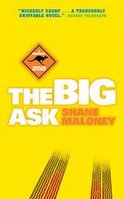Crime-fiction lines that make you laugh
 I've just finished one novel by a chuckle-inducing Australian and started another by an equally mirth-provoking Irishman, so I thought I'd give the gift of laughter for Christmas and list some of their funniest lines. Then I'll ask you to tell me some of your favorite laugh-getters or satirical crime-fiction jabs.
I've just finished one novel by a chuckle-inducing Australian and started another by an equally mirth-provoking Irishman, so I thought I'd give the gift of laughter for Christmas and list some of their funniest lines. Then I'll ask you to tell me some of your favorite laugh-getters or satirical crime-fiction jabs.From Shane Maloney's Nice Try, a story of love, murder, revenge and Murray Whelan's fight to give up smoking as Melbourne bids to host the 1996 Olympic Games:
"Like an economist, I worked backward, fabricating arguments to fit my conclusions, bolstering them with statistics plucked from thin air."
"According to what I'd read in the papers, he was a key player in preparations for the Seoul Olympics. You know, the ones with the persistent background odor of tear gas."
"At one time, the area had specialized in textile and footwear manufacturing, back before wiser heads than mine decided that the country needed fifteen-dollar Indonesian running shoes more than it
needed jobs."
"My heart, never reliably buoyant, sank. But I knew immediately what I must do. What any reasonable, thinking, politically aware member of the Labor Party would do under the circumstances. I left the scene."
 From Eoin Colfer's Artemis Fowl: The Eternity Code:
From Eoin Colfer's Artemis Fowl: The Eternity Code:"The other port was in Wiltshire, beside what humans referred to as Stonehenge. Mud People had several theories as to the origins of the structure. Hypotheses ranged from spaceship landing port to pagan center of worship. The truth was far less glamorous. Stonehenge had actually been an outlet for a flat, bread-based food. Or in human terms, a pizza parlor. ... And anyway, all that cheese was making the ground soggy. A couple of the service windows had even collapsed."And now, readers, what makes you laugh in crime fiction or at least smile widely?
"Nobody had a clue what had happened until they replayed the incident on the screen of Kamal the chicken man's camcorder. ... The traders laughed so much that several of them became dehydrated. It was the funniest thing to happen all year. The clip even won a prize on Tunisia's version of the World's Funniest Home Videos. Three weeks later, Ahmed moved to Egypt."
© Peter Rozovsky 2007
Technorati tags:
Shane Maloney
Murray Whelan
Australian crime fiction
Eoin Colfer
Artemis Fowl
Irish crime fiction
humorous crime fiction
Labels: Artemis Fowl, Australia, comic crime fiction, Eoin Colfer, Humor, Ireland, Murray Whelan, Shane Maloney












